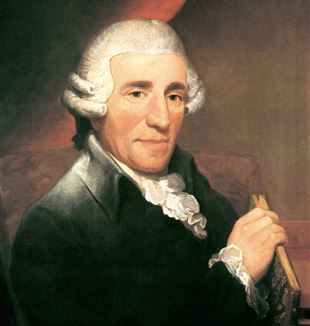
Haydn's March
In his time Franz Joseph Haydn was labeled Papa Haydn for his paternal care and acknowledgment of other composers of his time. Here we examine his generosity as a peer and his influence as a musician.The Classical Composer Database website yields a wealth of information, the kind of facts that musicologists like myself find exciting–i.e., who was asked to compose music for the 2008 Olympics (Krzysztov Penderecki), or what famous events occurred on particular days (for example, Monteverdi’s Orfeo premiered on Feb. 24th). You can also look up which composers were born during a particular month, which is how I learned that March should be a kind of feast time for lovers of 18th-century music, for it welcomed into the world J.S. Bach, George Telemann, Antonio Vivaldi, and a resourceful Austrian named Franz Joseph Haydn, born on March 31, 1732.
Trained as choirboy at St. Stephen’s Cathedral in Vienna, the 18-year-old Haydn found himself on the streets after his voice changed, earning a meager living as a freelance musician, teacher, and composer. His education in composition really began during this time; he took formal lessons and devoted himself to studying the works of other composers. The hard work paid off when, in 1761, he accepted what would be a lifetime appointment: music director at the court of the Hungarian prince, Anton Esterházy. Over the next three decades, much of Haydn’s time was spent at the prince’s lavish, but remote, country estate. Isolated from more cosmopolitan centers like Vienna and Paris, he later explained that his circumstances allowed him to be original. Haydn’s contracts with the Esterházys initially restricted his ability to publish and accept outside commissions, but these limits were later relaxed, and his reputation as a first-rate composer spread quickly throughout Europe. In the 1790s, Haydn twice accepted invitations to bring his music to London, where he received a superstar’s welcome, dining with the royal family and accepting an honorary doctorate from Oxford University.
Affectionately known in his later years as “Papa Haydn”–partly in acknowledgment of the paternal attention he gave to the musicians under his care–he is also generally acknowledged as the “father” of both the symphony and the string quartet. He was, moreover, Beethoven’s teacher and perhaps the only composer that Mozart recognized as a true peer during his lifetime. In fact, Mozart and Haydn played chamber music together, and frequented many of the same social circles. They also respected each other immensely as composers. A famous anecdote tells of Haydn proclaiming to Mozart’s father, Leopold, “Before God and as an honest man I tell you that your son is the greatest composer known to me either in person or by name.” For his part, Mozart honored Haydn in the highest terms: inspired by Haydn’s innovative string quartets, Mozart dedicated six quartets to his older peer, an unusual gesture at a time when dedications were generally made to members of the nobility (and hence their pocketbooks). Mozart’s dedication of the so-called “Haydn” quartets is also striking for its intimacy and humility:
A father who had decided to send his sons out into the great world thought it his duty to entrust them to the protection and guidance of a man who was very celebrated at the time, and who happened moreover to be his best friend. In the same way I send my six sons to you. [...] Please then, receive them kindly and be to them a father, guide, and friend! [...] I entreat you, however, to be indulgent to those faults which may have escaped a father’s partial eye, and in spite of them, to continue your generous friendship towards one who so highly appreciates it.
Haydn’s relationship with Beethoven was generally thornier, yet there can be no doubt that the master’s music left its mark on Beethoven’s creativity. It was Haydn who experimented with the kind of concentrated motivic development that would galvanize Beethoven’s symphonies, beautifully balancing humor and intensity in his instrumental writing.
It is easy to hear this legacy in the symphonies Haydn wrote for his London concerts. The London symphonies (Nos. 93-104) were immensely popular: Haydn knew how to please himself, his musical peers, and his audience. His sense of humor comes through brilliantly in No. 94, nicknamed “Surprise” for the sudden fortissimo exclamation point that punctuates the lilting melody of the slow movement. He also freely mixed popular and learned styles. It is no wonder that the audiences went wild; indeed, one contemporary critic thought it perfectly reasonable that “for souls capable of being touched by music, Haydn should be an object of homage, and even idolatry; for like our own Shakespeare, he moves and governs the passions at will.”
Like the symphonies, Haydn’s string quartets offer infinite variety, humor, and ingenuity, but they are more intimate and conversational. Among my favorites are the Opus 33 quartets, which Haydn describes as being written in a “quite new and special way.” Wit infuses every movement; one of the obvious novelties of these quartets is the transformation of the usual courtly Minuet movements into prankish Scherzos (Haydn’s label, literally “trick” in Italian). If you need a mood-lifter, listen to Op. 33, No. 2, popularly called “The Joke.” I won’t give away the punch line here, but I challenge you to keep from laughing before the final notes!